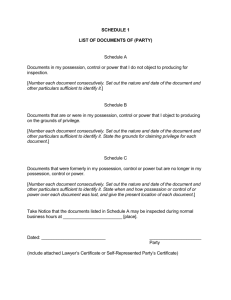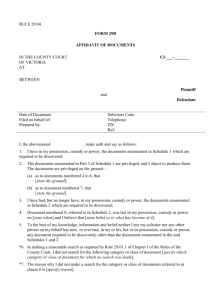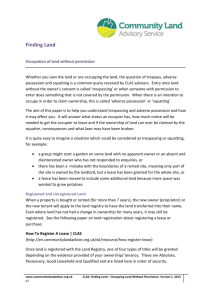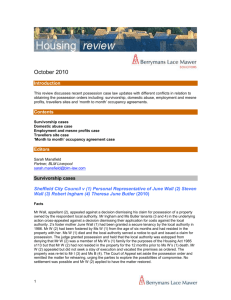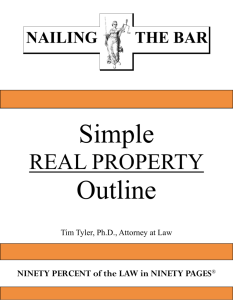Quote from the attached The Genuine Principles of the Ancient Saxon
advertisement
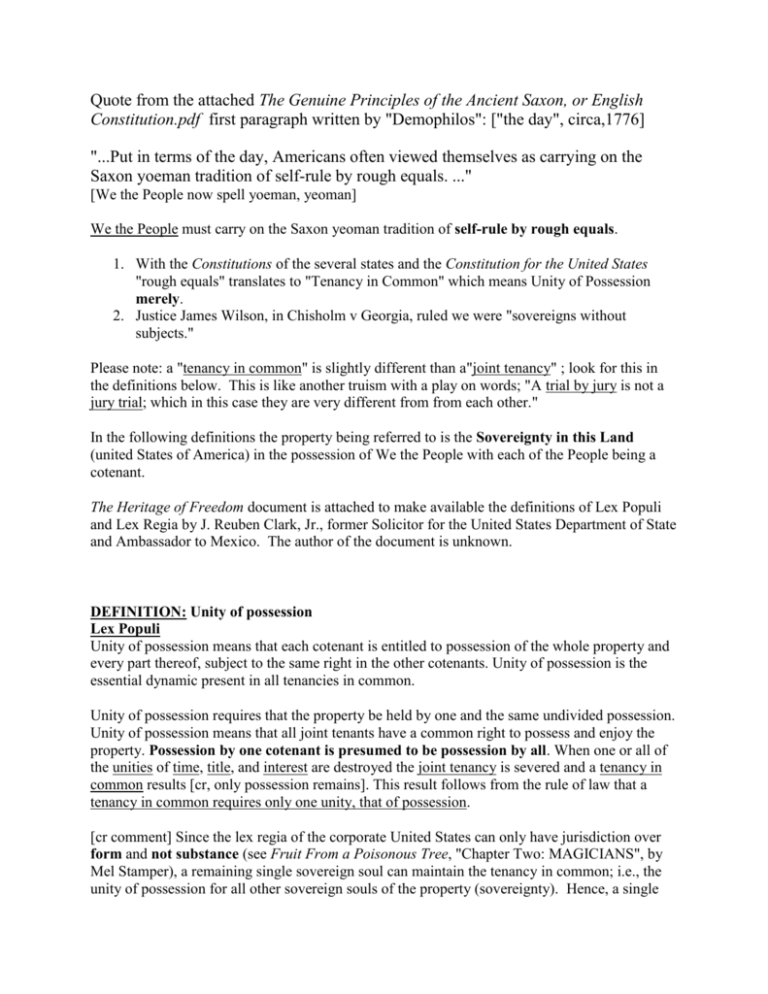
Quote from the attached The Genuine Principles of the Ancient Saxon, or English Constitution.pdf first paragraph written by "Demophilos": ["the day", circa,1776] "...Put in terms of the day, Americans often viewed themselves as carrying on the Saxon yoeman tradition of self-rule by rough equals. ..." [We the People now spell yoeman, yeoman] We the People must carry on the Saxon yeoman tradition of self-rule by rough equals. 1. With the Constitutions of the several states and the Constitution for the United States "rough equals" translates to "Tenancy in Common" which means Unity of Possession merely. 2. Justice James Wilson, in Chisholm v Georgia, ruled we were "sovereigns without subjects." Please note: a "tenancy in common" is slightly different than a"joint tenancy" ; look for this in the definitions below. This is like another truism with a play on words; "A trial by jury is not a jury trial; which in this case they are very different from from each other." In the following definitions the property being referred to is the Sovereignty in this Land (united States of America) in the possession of We the People with each of the People being a cotenant. The Heritage of Freedom document is attached to make available the definitions of Lex Populi and Lex Regia by J. Reuben Clark, Jr., former Solicitor for the United States Department of State and Ambassador to Mexico. The author of the document is unknown. DEFINITION: Unity of possession Lex Populi Unity of possession means that each cotenant is entitled to possession of the whole property and every part thereof, subject to the same right in the other cotenants. Unity of possession is the essential dynamic present in all tenancies in common. Unity of possession requires that the property be held by one and the same undivided possession. Unity of possession means that all joint tenants have a common right to possess and enjoy the property. Possession by one cotenant is presumed to be possession by all. When one or all of the unities of time, title, and interest are destroyed the joint tenancy is severed and a tenancy in common results [cr, only possession remains]. This result follows from the rule of law that a tenancy in common requires only one unity, that of possession. [cr comment] Since the lex regia of the corporate United States can only have jurisdiction over form and not substance (see Fruit From a Poisonous Tree, "Chapter Two: MAGICIANS", by Mel Stamper), a remaining single sovereign soul can maintain the tenancy in common; i.e., the unity of possession for all other sovereign souls of the property (sovereignty). Hence, a single young man or woman, upon reaching the age of majority can lawfully refuse (not consent) to become a 14th Amendment Citizen, thereby choosing to remain on the land retaining the tenancy in common for all of We the People (sovereign souls). Lex Regia In Porter v. Porter, 472 So. 2d 630 (Ala. 1985), the court held that, at common law(???cr) a joint tenancy could be severed by destruction of one of the four unities, that is, time, title, interest, and possession. [cr comment] Since this ruling is in 1985 the destruction referred to here has to be of the FORM not the SUBSTANCE. Further, it cannot be the sovereignty since under the American common law, that is, the Fundamental Law of the Land, the American common law can neither be amended or repealed by any legislature. In order to destroy the form of the tenancy in common of the sovereignty do they not have to destroy the forms of all the co-tenants? Requiring the consent of each of We the People". Of course, it could be that silent presumptions are being utilized to claim that the destruction of the unity of possession has already been accomplished. Yet, under the Fundamental Law of the Land silent presumptions are unlawful and even under lex regia silent presumptions may be rebutted. Beware, those of you who believe you are subject to lex regia, since the presumptions are silent your may not even know they exist. Do you not have to know they exist in order to know what to rebut?. Attachments: 1. The Genuine Principles of the Ancient Saxon, or English Constitution.pdf written by "Demophilos." 2. The Heritage of Freedom, author anonymous. A revelatory look at how Roger Williams shaped the nature of religion, political power, and individual rights in America. For four hundred years, Americans have wrestled with and fought over two concepts that define the nature of the nation: the proper relation between church and state and between a free individual and the state. These debates began with the extraordinary thought and struggles of Roger Williams, who had an unparalleled understanding of the conflict between a government that justified itself by "reason of state"-i.e. national security-and its perceived "will of God" and the "ancient rights and liberties" of individuals. This is a story of power, set against Puritan America and the English Civil War. Williams's interactions with King James, Francis Bacon, Oliver Cromwell, and his mentor Edward Coke set his course, but his fundamental ideas came to fruition in America, as Williams, though a Puritan, collided with John Winthrop's vision of his "City upon a Hill." Acclaimed historian John M. Barry explores the development of these fundamental ideas through the story of the man who was the first to link religious freedom to individual liberty, and who created in America the first government and society on earth informed by those beliefs. The story is essential to the continuing debate over how we define the role of religion and political power in modern American life.



